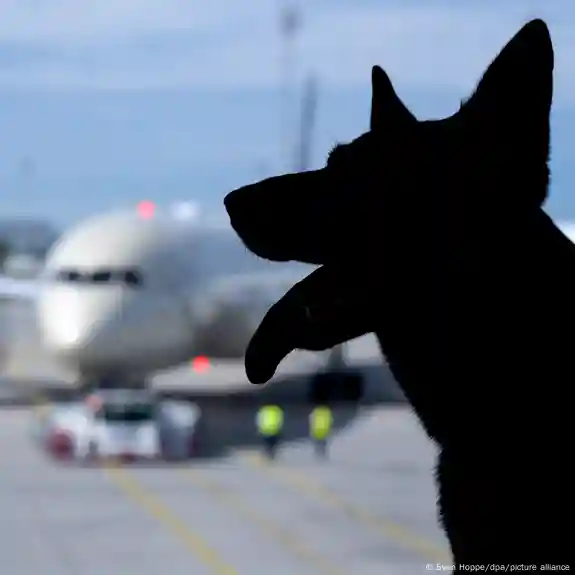The European Union’s top court concluded that pets should be considered luggage, not passengers. But that was not the only aviation case on the court schedule.https://p.dw.com/Pets aren’t passengers, EU top court findsMark Hallam with AFP, dpa1 hour ago1 hour agoThe European Union’s top court concluded that pets should be considered luggage, not passengers. But that was not the only aviation case on the court schedule.
Pet owners would need to declare a special interest in delivery to be eligible for additional compensation if their animal was lost in transit, the court ruledImage: Sven Hoppe/dpa/picture alliance
Advertisement
The Court of Justice of the European Union (CJEU) dealt with a pair of aviation appeals on Thursday, issuing advisory judgments after queries from courts in Austria and Spain.
In both instances, it sided with airlines over the appellants — with a passenger seeking compensation for a lightning-enduced seven-hour delay, and with a woman seeking additional non-material damages for her lost dog in the other.
Lightning strikes can constitute ‘extraordinary circumstances’ and limit liability
In the first case, a passenger who experienced a lengthy delay waiting for a flight from Iasi in Romania to Vienna in Austria used a German online service specilalizing in seeking compensation from airlines to claim €400 (roughly $465) in damages.
Austrian Airlines, meanwhile, argued that a lightning strike on the plane shortly before it landed in Iasi, which led to mandatory safety inspections, constituted extraordinary circumstances and so limited its legal liability for the delay.
The court found that a lightning strike can count as extraordinary circumstances, provided that the airline could “show that it took all reasonable measures to avoid the extraordinary circumstances and the consequences thereof, such as a long delay.” It was up to the court in Austria to determine if this was the case, the CJEU said.
Pets aren’t passengers, EU top court finds
The European Union’s top court concluded that pets should be considered luggage, not passengers. But that was not the only aviation case on the court schedule.
Pet owners would need to declare a special interest in delivery to be eligible for additional compensation if their animal was lost in transit, the court ruled
The Court of Justice of the European Union (CJEU) dealt with a pair of aviation appeals on Thursday, issuing advisory judgments after queries from courts in Austria and Spain.
In both instances, it sided with airlines over the appellants — with a passenger seeking compensation for a lightning-enduced seven-hour delay, and with a woman seeking additional non-material damages for her lost dog in the other.
Lightning strikes can constitute ‘extraordinary circumstances’ and limit liability
In the first case, a passenger who experienced a lengthy delay waiting for a flight from Iasi in Romania to Vienna in Austria used a German online service specilalizing in seeking compensation from airlines to claim €400 (roughly $465) in damages.
Austrian Airlines, meanwhile, argued that a lightning strike on the plane shortly before it landed in Iasi, which led to mandatory safety inspections, constituted extraordinary circumstances and so limited its legal liability for the delay.
The court found that a lightning strike can count as extraordinary circumstances, provided that the airline could “show that it took all reasonable measures to avoid the extraordinary circumstances and the consequences thereof, such as a long delay.” It was up to the court in Austria to determine if this was the case, the CJEU said.
Heavy rain and lightning occur near Orlando International Airport (MCO) in Orlando, United States, on September 5, 2023.Heavy rain and lightning occur near Orlando International Airport (MCO) in Orlando, United States, on September 5, 2023.
Planes are struck by lightning considerably more often than you might thinkImage: Ronaldo Silva/NurPhoto/picture alliance
It noted that the mandatory checks are a measure seeking to ensure safety. The CJEU said its finding was partly aiming to prevent airlines “from being encouraged not to take the necessary measures and to prioritize the maintaining and punctuality of their flights over that objective of safety.”
While the notion might sound alarming, lightning strikes are fairly common in aviation. Most estimates suggest a commercial airliner is likely to be hit by lightning once or twice a year on average, depending on factors like the weather on the route or routes it flies.
Modern design features, redundancies for core systems, and an aircraft’s aluminium fuselage acting as a Faraday cage mean that strikes, which in decades past caused some major plane crashes, very rarely pose a serious threat to a modern passenger plane in flight. However, they can cause damage which should then be repaired on the ground.







